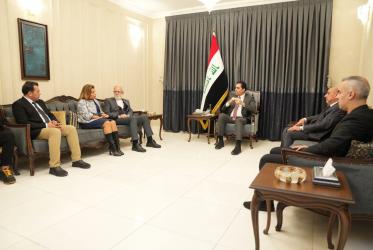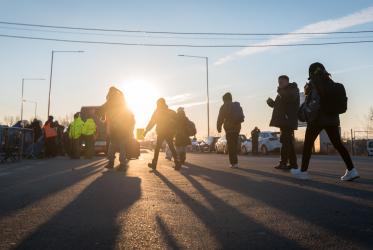Dear Ladies and Gentlemen, Dear Colleagues,
Reflecting on what to say in the few minutes I have been given I am confronted with a dilemma. On one hand it is easy and self-evident to conclude what would be necessary short and long term priorities. But on the other hand it is more difficult to conclude what would help to make this list of actions a priority for voters, their governments, struggling intergovernmental system and those of us who seek to influence it.
My name is Pauliina Parhiala and I am the Director of the Action by Churches Together, ACT Alliance, a global coalition of 150 churches and church related organisations engaging worldwide on humanitarian relief, long term development and advocacy. Today, we respond in humanitarian hotspots and our members continue to accompany vulnerable populations since decades.
First, the refugee crisis is global and needs to be addressed globally. Both the root causes and symptoms require global response. There is an incredible urgency to bring an end to the war in Syria. Therefore, the peace process continuing in few days here in Geneva needs to support of all. There needs to be considerable pressure on the parties, but also on the involved governments. The same goes to the other countries of instability – such as Iraq, Eritrea and Afghanistan. The failure of negotiated agreements on ending violence, oppression and human rights violations as well as power sharing can never be mended by any humanitarian or military efforts. Also, a considerable increase of refugees to be settled outside their immediate regions is necessary. Currently, the immediate neighbours – often struggling with instability and economic challenges – carry major burden. It is necessary to negotiate refugee burden globally. Simultaneously a more concerted effort, with financing made available, needs to be placed on initiatives strengthening resilience and self-reliance of refugee communities. What Europeans may be labelling as “a refugee crisis” is just the peak of the iceberg. There may be a crisis, but it relates to Europe and how it responds to the situation. Some 60 million people in forced mobility I would call a crisis.
Second, the intergovernmental system needs to guarantee access to adequate humanitarian relief to all those in need. This requires addressing several factors; the funding shortage and the willingness of many donor governments to spend their previous humanitarian and development funding at their national refugee situations; the access of affected populations to safe passages, good quality and timely humanitarian relief; actions of governments who deny the humanitarian crisis in their country and shrink humanitarian space; rogue wars and perpetrated continued insecurity by non-state groups who worsen the security situation and strengthened leadership and collaboration by all humanitarian actors to ensure that relief efforts scale up and bring synergies to the benefit of vulnerable populations. Explicit commitment to the International Humanitarian Law and humanitarian principles is required by all actors and increased support to local humanitarian actors in difficult conditions is necessary.
Third, addressing refugee situation needs to be based on human rights. Human rights, rule of law and solidarity are the corner stones of the global multilateral system. While not perfect, it is what we have and what all day to day political life should be based on. Therefore national policies in transit and recipient countries should be fully implementing principles of protection; reception conditions should be of proper quality and asylum procedures in full respect and adherence to international refugee law and international human rights law. Increased emphasis of protection and welcome should be placed on unaccompanied children. Civil society actors including faith communities as well as individual people and families have a huge task in complimenting the actions of public sector. All of this should not be rocket science; however, more difficult and growing dilemma is the addressing political and economic rights of refugee populations whose length of stay in “countries of transit” both in refugee camps and host communities is growing longer and longer without access to quality education, decent or any work or civic engagement. The long term situation needs to be studied and addressed.
Fourth, shift political debate in receiving countries. In environments where the political environment is growing increasingly hostile to receiving refugees and allowing migration in general the political parties, government leaders, parliamentarians, civil society, faith leaders and business actors have a particular responsibility to start consciously to shift the political debate. We need to take urgent, collective responsibility for an attitude where a stranger is welcomed, where significant efforts are made to make those arriving to feel at home. This requires open discussions to facilitate understanding of cultural and religious differences and similarities and addressing with robust hand hatred crimes. As many societies grow increasingly polarized on these issues the leaderships have a particular responsibility to fuel dialogue.
Fifth, learning from our mistakes and building world which is fit for the future. It seems that power structures which continue to perpetrate violence and suffering are not exposed enough. While many international legal instruments are helpful, they are based on a context of a well-functioning nation state. This is not a reality in many parts of the world where people suffer. There needs to be therefore an effort to learn from mistakes and imagine together what would be the world fit for the future. We need a world which is capable of addressing its major challenges – from inequalities to climate change.
In concrete terms what I would like to suggest is
· Increased voice of affected refugee populations in policy crafting through hearings, gathering of feedback and supporting and resourcing the affected communities to play increasingly a role in addressing their own needs and rights. Initiative to study and define rights of the populations who stay in transit for decades.
· Critical re-evaluation of good humanitarian donor practises in the context of the World Humanitarian Summit later this year and a dramatic scaling up of humanitarian financing worldwide and in particular in the countries of major crisis.
· Independent commission to study failures of Security Council in particular and the multilateral system more general in fulfilling its political and military mandates and the weaknesses of current nation and state-building policies. This would help to highlight some of the lessons learned of the international community in failing to address state failure, conflict and war and helping to arrive to policies of stability, governance and power sharing in areas where “nation” or “state” does not offer valid concepts for governance in general or anymore. Utilise previous helpful recommendations from past Commissions, such as around Responsibility to Protect.
· An investment by (and investment in!) faith based organisations and other civil society for a global effort and concerted effort to shift the political debate in their countries; engaging actively in welcoming the stranger and investing in advocacy for vulnerable populations and legal aid to refugees and refugee communities as well as filing for criminal processes for the use of xenophobic and racist language and related violence.
Going back to my original dilemma: self-evident, right? But politically unrealistic? Darkness is absence of light. Nothing more. And therefore changeable if decisive and concerted effort, which we all need to be part of, is arrived to. Starting from here and now. We should, under no condition, allow human suffering to become other but immediate crisis and disgrace which we all need to be part of addressing. Thank you.



